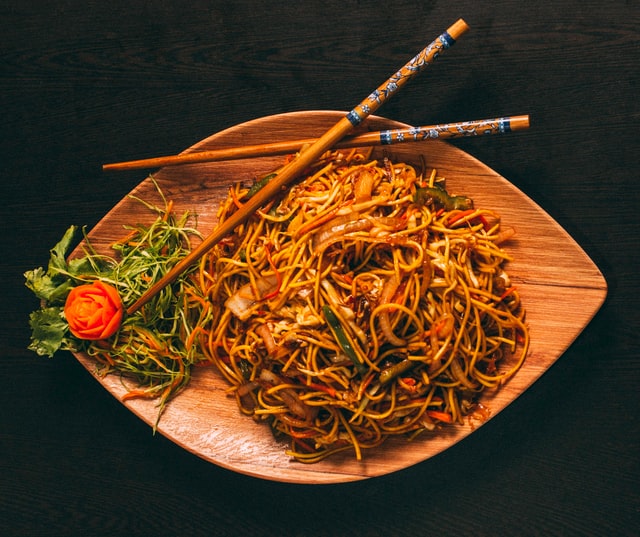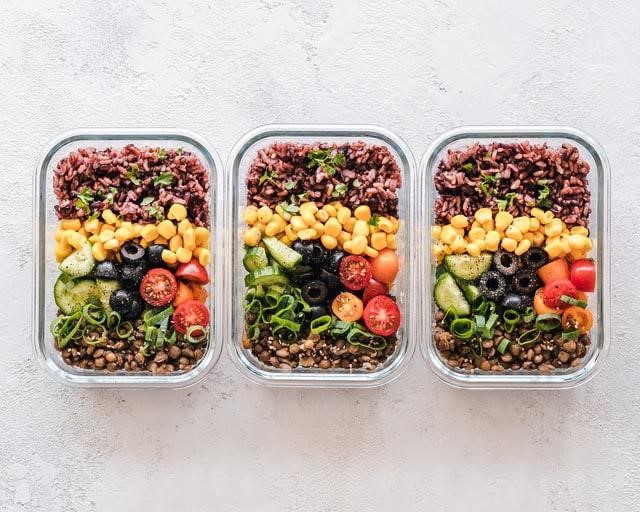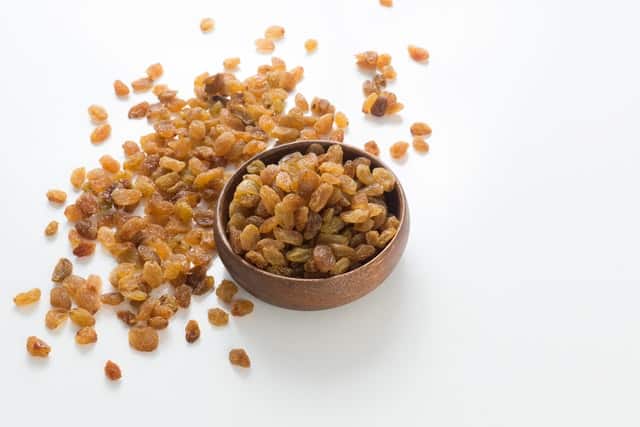
It is known that red foods are helpful for people with diabetes. Not only do they help improve blood sugar levels, but they also help regulate the amount of insulin produced by the pancreas. Raisins are certainly no exception to this.
Contents
The consumption of dried fruits, such as raisins, sultanas, currants, dates, and prunes, is associated with a reduced risk of type 2 diabetes (T2D). Some people claim raisins can help with diabetes and other diseases in general. But how can we know this?
In this article, we will talk about the health benefits raisins have and how they can help you fight diabetes. Raisins are, in fact, healthy and have some impressive benefits for people with diabetes.
Can Raisins Help Prevent Your Blood Sugar Levels Raising?
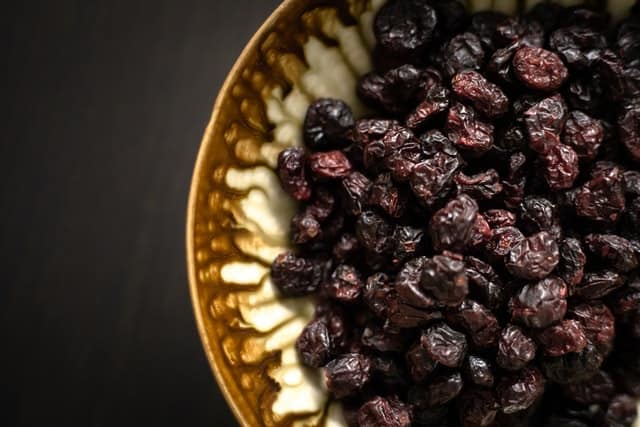
Raisins are sun-dried grapes, a common ingredient in particular cakes and granola, and are often eaten plainly as a snack. Of course, depending on the grape, there are actually a wide variety of raisins, but generally speaking, raisins is the term for darker colored dried grapes. But are there dark effects to eating them if you have diabetes?
Should you stay clear or not? A research study has shown that the soluble fiber in raisins can help lower blood sugar levels and control diabetes. This also helps regulate blood sugar levels and improves insulin sensitivity.
Not only are sun-dried grapes a great source of fiber, but they are also rich in antioxidants. Raisins are full of pectin, a soluble fiber that does not affect blood sugar. Raisins help lower blood sugar levels, and thus help control diabetes. Alongside being rich in fiber, Raisins also have a low glycemic index. As such, eating raisins will not make you feel hungry (or 'hangry') when your blood sugar is low above the normal range.
To reiterate again, Raisins are packed with fiber, iron, and magnesium, which are essential for a healthy body. Read this article to know about the advantages of consuming raisins. Are you a diabetic patient and need to lower your blood sugar level? Here is a list of fruits that will help you reduce your diabetes-related issues.
One study showed that eating one whole cup daily improved blood sugar control without needing additional insulin in people with Type 1 diabetes. Another randomized, double-blind trial found that improving glycemic control was possible only when diabetics ate only 7.5g dried plums.
Research has shown that a diet high in Omega-3 fatty acids can lower blood sugar levels, and this makes sense because ARA works by increasing glucose uptake into the cells.
Amin Esfahani, Joanne Lam, and Cyril W. C. Kendall did a recent study on the acute effects of raisin consumption on glucose and insulin responses. Their study showed that people with Type 2 Diabetes who consumed raisins had a 35% reduction in fasting glucose levels after 15 weeks, and was generally effective at reducing diabetes symptoms. People with type 1 diabetes for comparison only saw about a 17% reduction in blood sugar level when consuming the same amount of raisins.
Enjoying Raisins The Healthy Way

Due to their water content and high fiber count, they can be enjoyed at any time as part of a healthy diet plan, along with other foods loaded in fiber and protein, such as almonds, brown rice and more. Some great ways to consume Raisins include; a tasty oatmeal bar, granola or even salad.
A Tasty Granola Recipe Featuring Raisins
- 4 cups of Ezekiel 4:9 Crackers or granola cereal
- ½ bag of raisins (about 1 ⅘ cup)
- 2-4 tablespoons of butter (I use unsalted, but you can substitute with olive oil or coconut oil if that's more to your liking)
- 1 teaspoon of cinnamon
- Pinch of salt (or add 2 teaspoons if you like)
Instructions
- Preheat the oven to 350F
- Lightly grease a baking sheet with some cooking spray or melted butter, then set aside.
- In a medium saucepan, bring 1 -2 inches up from the bottom tap water until it reaches 110 degrees.
- Mix it together so that all oats are covered with as much raisin-ness as possible.
- Spread out over a cookie sheet.
- Bake at 300 degrees for approx. 12-16 min.
Once they are done, then you can cut them up and put them in Ziploc bags or containers to store into a cool dark place until ready to eat. This is a great recipe on Sunday morning, when people have time to do the last minute baking of this granola before going off their blood sugar roller coaster ride that starts right after lunch time has ended.
Everything In Moderation
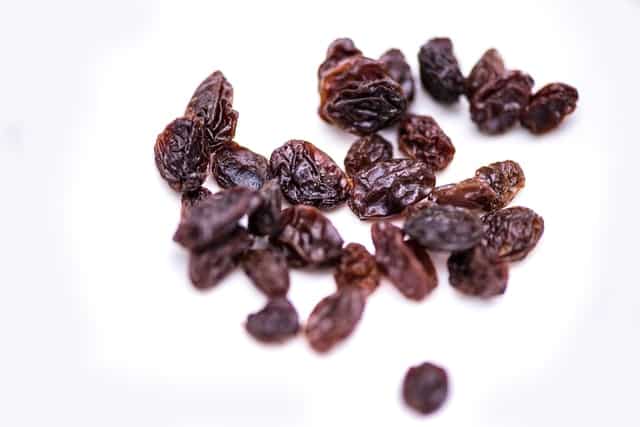
Like many foods with health benefits, less is more. While raisins hold excellent properties for your health, it is not recommended to overdo it. Raisins can be an excellent sweet treat, but it might not be advisable for diabetics at certain times along their diet plan. So when and why should we avoid consuming raisins? Well, if you are a diabetic, raisins can add to your blood sugar level, since they contain high levels of fructose.
Raisins are mostly made up of dried grapes, and especially raisins, which vary as they depend on the brand. Raisin researchers in northern France have discovered that while these small round, sun-dried fruits contain carbohydrates like other fruits, table sugar (sucrose), they also contain naturally occurring fructose – a type of natural sugar natively linked to adverse health effects.
There is some controversy surrounding the effects of fructose on increasing the likelihood of cardiometabolic diseases in the dietary health community. Throughout the diabetes process, health experts recommend carbohydrates should be limited, and mainly carbohydrates, other than in small amounts.
With this special exception, we would highly advise diabetics to include raisins as part of their diet plan, as it is an excellent source of dietary fiber, which may cause too much blood sugar in otherwise healthy individuals.
Raisin is a rich source of dietary fiber, which is essential for the proper functioning of the digestive system and its regular elimination from the body. The more we consume good quality fiber food like dried fruit, during our daily routine, can contribute to maintaining the health level by improving digestion efficiency, regulating bowel movements and promoting intestine movement with gastric regularity
It is a great source for vitamin C and iron, which are essential for the proper functioning of special cells in our body that help with blood clotting. Both these vitamins provide energy to muscles during insulin function, as well as deal with anti-blood clots at critical moments, such as birth or surgery, when large doses might not be readily available (iron especially).
In their study, Esfahani, Lam, and Kendall concluded that;
"While long-term studies are needed, the present study demonstrates that in addition to the aforementioned benefits, raisins can acutely improve postprandial glycaemic control, and, as a low-GI food, may serve as a healthy snack, when used in moderation, in the diets of healthy individuals, and for those with diabetes or impaired glucose tolerance."
In other words, overall, the benefits of those with diabetes eating raisins outweigh the cons of eating them.
Bottom-line
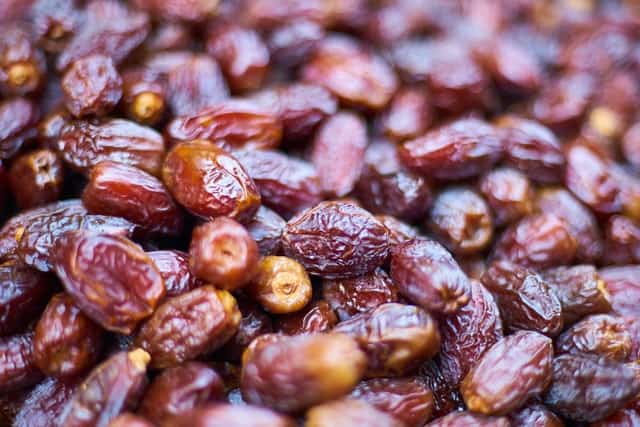
It's a no-brainer, but it's always important to consult a specialist regarding dietary needs when you have diabetes. Your doctor may prescribe a different medication or change your diet to help you regulate blood sugar if necessary. It is wise to get tests occasionally, such as liver enzymes or kidney function checkups, just in case health complications occur.
There is an increased risk of death in people who already have diabetes or that were diagnosed after the study began. You should check with your doctor before starting any new diet to see if there are side effects you may suffer, such as nausea, vomiting, and itching on wearing contact lenses.
Dehydrated fruits should not be taken at the same time, but can be eaten together, provided this has been previously discussed with a health care provider first because common medicines. If you have a child, it is not recommended you feed them raisins until they are at least 5 years of age. The sugars in them are too much for children to tolerate, and potentially a choking hazard in young infants.
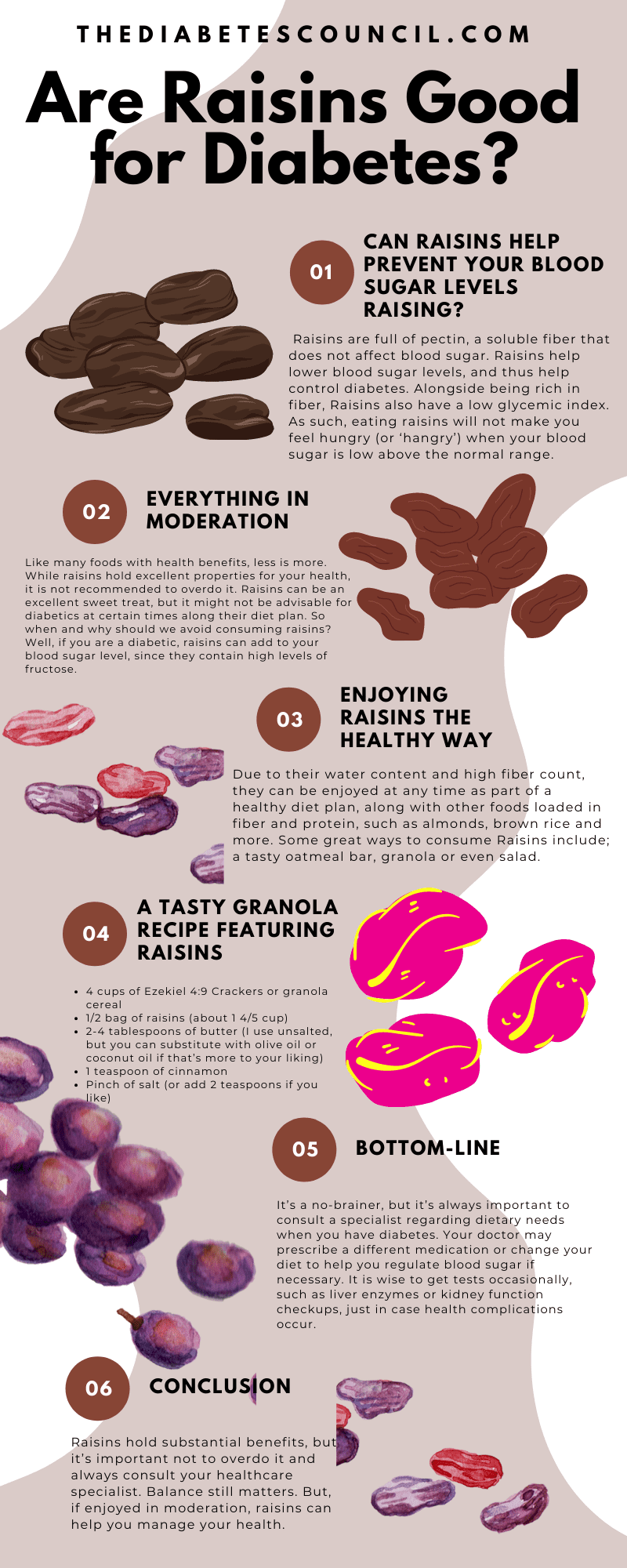
Conclusion
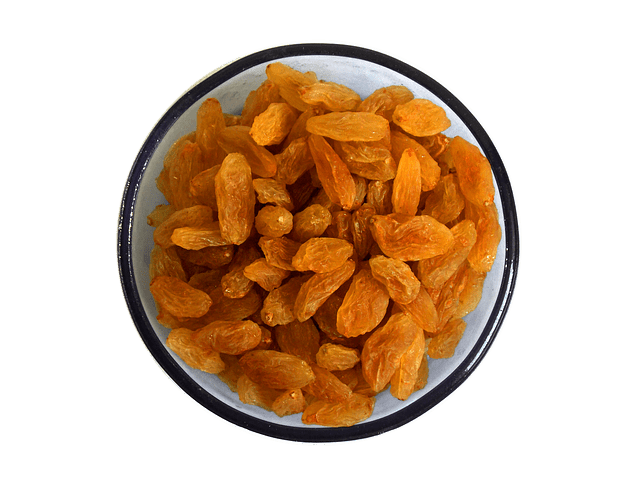
In this article, we have covered the health benefits that raisins have for people with diabetes. We have also given you a taste of how to add raisins to your diet the healthy way. It’s important to note that even though raisins are healthy, they should be eaten in moderation.
As always, we emphasize the importance of speaking to your doctor or healthcare provider when it comes to your diet. Taking your blood sugar levels under control is of utmost importance when it comes to fighting diabetes. So, what's the takeaway? Raisins hold substantial benefits, but it's important not to overdo it and always consult your healthcare specialist. Balance still matters. But, if enjoyed in moderation, raisins can help you manage your health.


